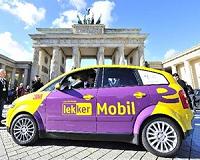 |
Riverside CA (SPX) Feb 09, 2011 Ever wonder how much fuel you can save by avoiding stop-and-go traffic, closing your window, not using air conditioning or coasting toward stops? Research at the University of California, Riverside's College of Engineering Center for Environmental Research and Technology (CE-CERT) can give you the answers. The research field is called eco-driving, which refers to providing drivers with advice and feedback to minimize fuel consumption when driving. Eco-driving, which has been practiced for years in Europe and is part of the driver education curricula there, is now receiving a lot of attention in the United States because of calls to increase fuel economy standards and reduce carbon dioxide emissions. "This is a really big deal," said Matthew Barth, the director of CE-CERT and the Yeager Families Professor of Electrical Engineering. "Automobile manufacturers are doing anything possible to make cars more fuel efficient." Much of the eco-driving research at UC Riverside and other University of California campuses, including UC Berkeley, focuses on using an on-board eco-driving device, similar to a GPS unit, which provides instantaneous fuel economy feedback under real-world driving conditions. In a study last year, 20 drivers in the Riverside area used the eco-driving device, known as Eco-Way, for their daily commute for two weeks. Researchers found it improved fuel economy by 6 percent on city streets and 1 percent on highways. Eco-driving studies in Europe, most of them conducted in pre-planned driving courses, have found fuel economy improvements between 5 and 15 percent. A survey provided to the Riverside area drivers found that most are willing to adopt eco-driving practices in the near future. On a one to 10 scale, with 10 being the most likely to adopt, the average score from drivers was 7.4. The survey also found 95 percent of drivers would adopt eco-driving strategies if gasoline reaches $4.40 per gallon. The study was performed by Kanok Boriboonsomin, an assistant research engineer at CE-CERT; Alexander Vu, a junior development engineer at CE-CERT; and Barth. Those same engineers are now working with researchers at UC Berkeley and UC Davis on a follow-up study in the Bay area, which is funded by the University of California's Institute of Transportation Studies (ITS) Multi-Campus Research Program and Initiative on Sustainable Transportation and ITS Davis' Honda Endowment for New Mobility Studies. During the study, participants will use 10 eco-driving devices for two months at a time, said Susan Shaheen, the principal director of the study and co-director of the Transportation Sustainability Research Center at UC Berkeley. Subjects will take a pre-survey at the beginning of their participation and a post-survey at the end. The study will last eight months and collect data on about 30 participants. Meanwhile, UC researchers are hoping to obtain funding from federal agencies to conduct a larger-scale eco-driving study, which would likely involve hundreds of vehicles, Barth said. The study in the Bay area is a public-private partnership that includes UC Berkeley, UC Riverside, UC Davis and Earthrise Technology, a division of Digisec Group. Earthrise, based in Redwood City, specializes in hardware and software components of eco-driving technology; it subsidized the cost of the devices for the study and programmed them according to the needs of the project. Earthrise also worked with researchers at CE-CERT at UC Riverside on the study completed last year. On the suggestion UC Berkeley researchers, in Dec. 2009, Earthrise President Jim Disanto approached the researchers at CE-CERT. Disanto, who had studied about a dozen eco-driving and eco-routing systems developed throughout the world, was impressed by what he saw at UC Riverside. "They were the only ones with a comprehensive and robust system that actually worked," Disanto said. "They captured all the relative inputs and developed a robust algorithm which effectively modeled and predicted vehicle fuel consumption and emissions across a wide range of operating conditions." The partnership between Earthrise and the University of California employs the most up-to-date technology to advise motorists on how specific driving behaviors impact fuel consumption and emissions. In addition, it interprets the more than 3,000 trouble codes in modern vehicles to provide specific and relevant information to drivers on the health of their vehicle, including, for example, low tire pressure, which can reduce gas mileage. Disanto said this will help drivers understand today's complex vehicles in ways that promote eco-driving. He noted that eco-driving technology is already in vehicles like the Toyota Prius and Honda Insight. But, unlike those products, his device isn't tied to the years-long automobile manufacturing cycle because it is a mobile, after-market unit that can be reprogrammed remotely and adjusted to the latest technological developments.
Share This Article With Planet Earth
Related Links UC Riverside Eco-Driving Study College of Engineering Center for Environmental Research and Technology (CE-CERT) Car Technology at SpaceMart.com
 World record e-car burns amid controversy
World record e-car burns amid controversyBerlin (UPI) Feb 8, 2011 Shortly before Christmas, a world record-setting electric car developed by small German start-up DBM Energy burned. Authorities are investigating and conspiracy theorists have since accused established car-making giants, which were embarrassed by the record, as responsible for the fire. The story started in October, when Mirko Hannemann, the 27-year-old founder of DBM Energy, drove his ... read more |
|
| The content herein, unless otherwise known to be public domain, are Copyright 1995-2010 - SpaceDaily. AFP and UPI Wire Stories are copyright Agence France-Presse and United Press International. ESA Portal Reports are copyright European Space Agency. All NASA sourced material is public domain. Additional copyrights may apply in whole or part to other bona fide parties. Advertising does not imply endorsement,agreement or approval of any opinions, statements or information provided by SpaceDaily on any Web page published or hosted by SpaceDaily. Privacy Statement |